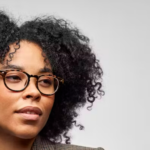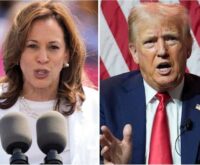By Nick Anderson
The Washington Post, January 11, 2017 —

Billionaire Charles Koch, left, with Johnny C. Taylor Jr., president and chief executive of the Thurgood Marshall College Fund. (Thurgood Marshall College Fund)
Billionaire Charles Koch, a prominent backer of conservative political causes, is giving $25.6 million to enable scholars at historically black universities to research education, criminal justice and entrepreneurship in communities plagued by high crime and other social ills.
The donation, made through Koch’s foundation and his family business, will help launch a research center affiliated with the Thurgood Marshall College Fund.
Named for the first African American justice to serve on the U.S. Supreme Court, the Marshall fund supports dozens of historically black colleges and universities, or HBCUs. Among them are Howard University and the University of the District of Columbia in the nation’s capital, and Bowie State and Morgan State in Maryland.
“Education transformed my life, and I’ve committed to do all I can to give others that same opportunity,” Koch said in a statement Wednesday evening. The Marshall fund has made that same commitment, he said, “giving students and scholars the chance to discover new ways to overcome barriers holding too many people back. As they succeed, so does our society.”
Koch, 81, of Wichita, is perhaps best known for working with his brother David Koch to promote conservative politicians and causes aligned with his free-market views. But the Kansas businessman also is a major academic philanthropist, which has generated controversy on some campuses.
Last year, the Charles Koch Foundation pledged $10 million to George Mason University in Northern Virginia as part of a $30 million package of gifts that led GMU to rename its law school for late Supreme Court Justice Antonin Scalia.
The foundation also has spread millions of dollars to numerous other schools to support research into economics and other topics. Some say the largesse compromises the independence of universities.
“Koch’s presence in higher ed is not educational, but strictly political in purpose,” said Ralph Wilson of Tallahassee, co-founder of a group called UnKoch My Campus. Wilson said donations come with strings attached.
“When they give the donor control, the trade-off is academic freedom,” he said.
Brian Hooks, president of the Koch foundation, denied that the organization, based in Arlington, Va., is seeking to advance a political agenda through academic gifts. “Our commitment across the board with all of our grants . . . is to open inquiry,” he said in an interview Tuesday at the D.C. office of the Marshall fund. “We’re looking to support great scholars.”
The partnership with the Marshall fund is not the first academic initiative Koch has sponsored for HBCUs. In 2014, the Koch foundation and Koch Industries pledged $25 million to the United Negro College Fund for student scholarships and other aid to HBCUs.
The new gift, distributed over five years, will enable the Marshall fund to launch what is called the Center for Advancing Opportunity. Based in Washington, the center will support HBCU faculty researching education, criminal justice and entrepreneurship in “fragile communities” — defined as places where residents face “significant barriers” to opportunity. These communities would typically have high crime, troubled schools and various other economic and social problems.
The center also will award scholarships to HBCU students, sponsor academic forums and work with Gallup to survey targeted communities on issues of interest and develop a metric called an “opportunity index.” Gallup’s chairman, Jim Clifton, is also chairman of the Marshall fund’s board.
Johnny C. Taylor Jr., president and chief executive of the Marshall fund, traced the genesis of the gift to a television interview he heard two years ago in which Koch was discussing the perils of “over-criminalization” and other barriers to opportunity.
Taylor said he found Koch’s views intriguing and sent him a letter soon afterward. He was surprised to get a call from a Koch representative within a few days. That started a dialogue. In late 2015, Taylor attended a conference Koch sponsored in New Orleans called “Advancing Justice.”
Taylor said that even though some HBCUs were represented at the conference, it struck him that relatively few people of color were participating in a discussion of issues critical to minority groups.
“You need to bring more of the community in and listen to them,” Taylor told Koch’s team, which led them to ask Taylor what more should be done.
In October, Taylor flew to Wichita to discuss a grant proposal with Koch. Taylor said Koch insisted in their meeting that the leader of the Marshall fund should sit at the head of the table.
“This guy is really concerned about America,” Taylor said. “He’s a patriot. And so am I. That was something that really struck me.”
Taylor said he is unconcerned about the possibility that the Marshall fund will face criticism for working with Koch. He said he is focused on solving problems in Chicago, Charlotte, Ferguson, Mo., and other places where recent tensions between police and minority communities have underscored long-standing social and economic challenges.
Universities can play a role, Taylor said.
“Part of our mission is to figure out what’s going wrong” and search for solutions, he said. “To be clear, that costs money.”










